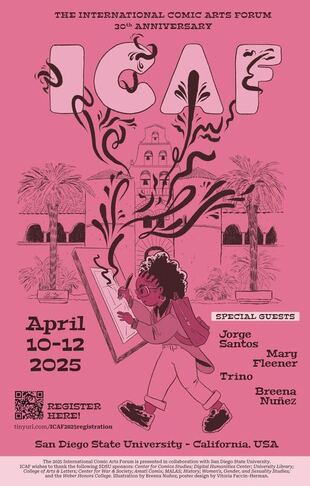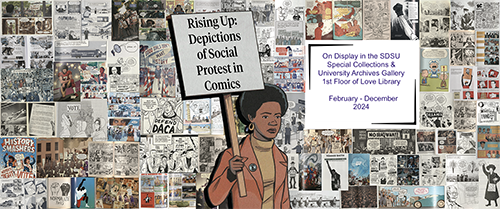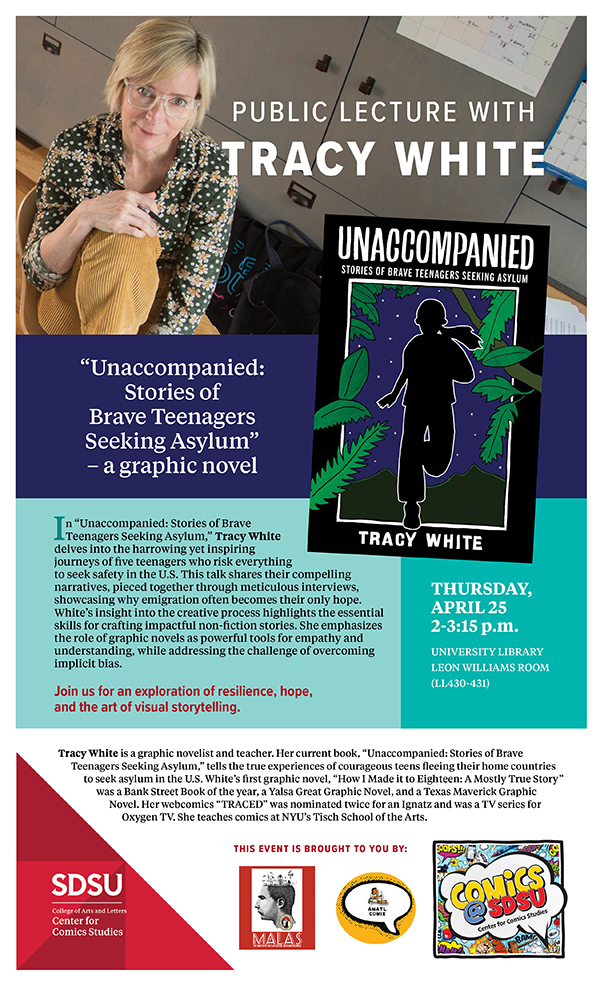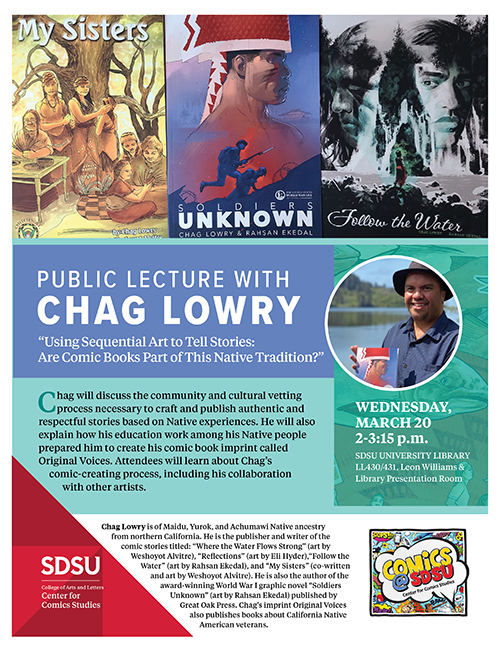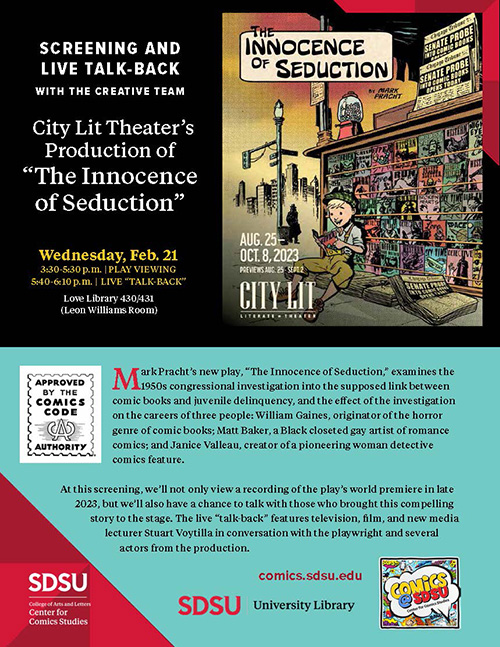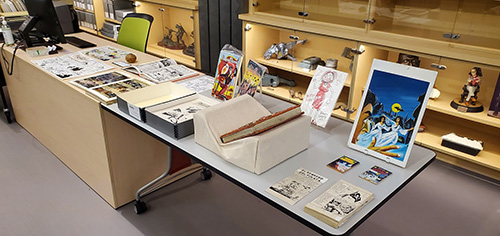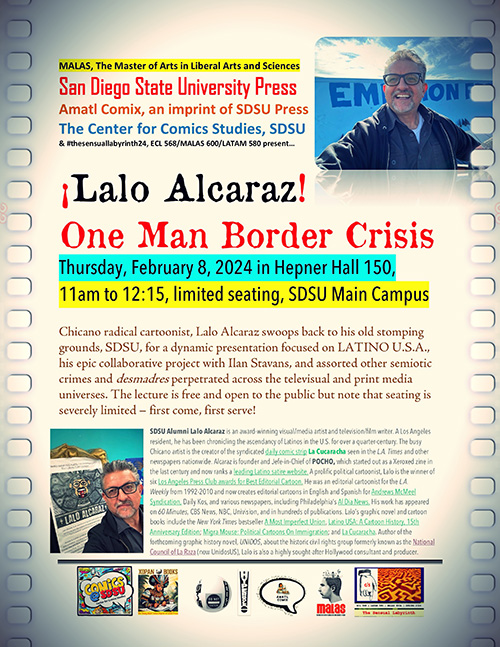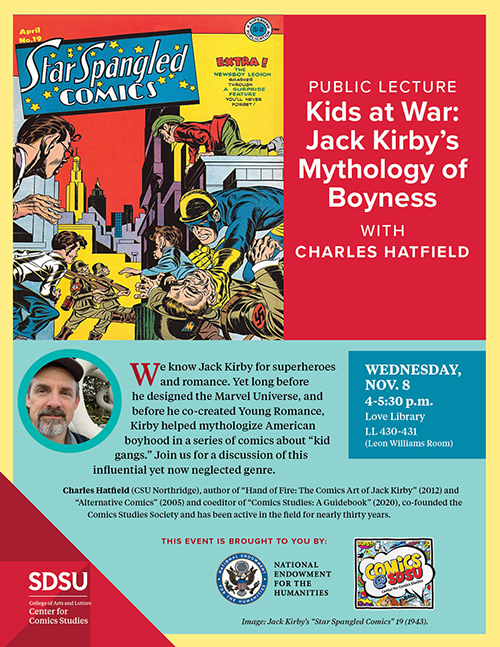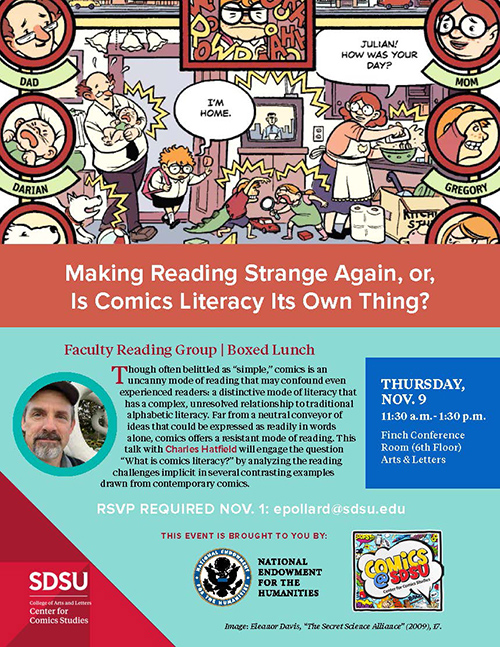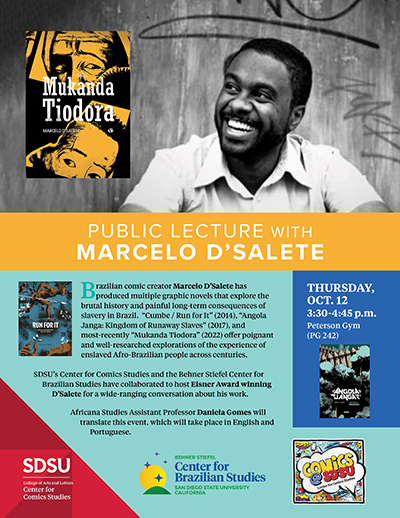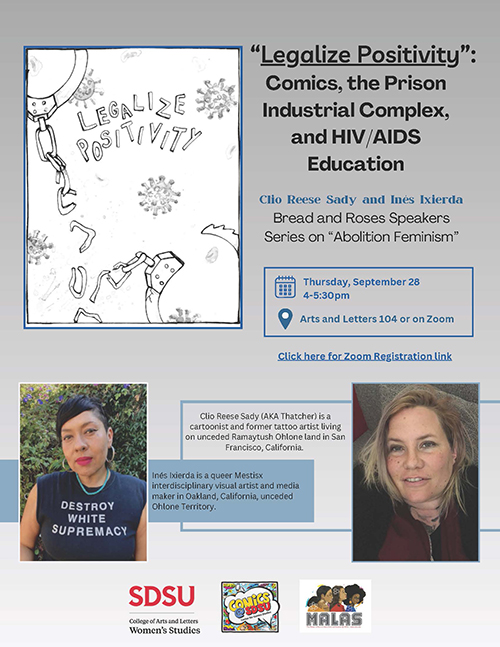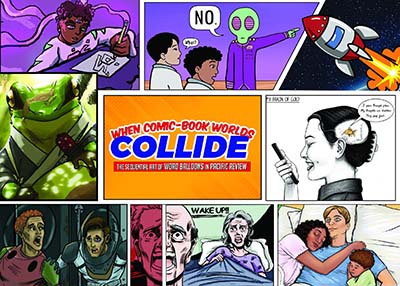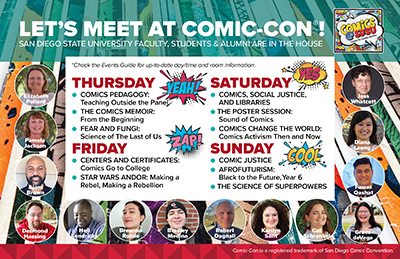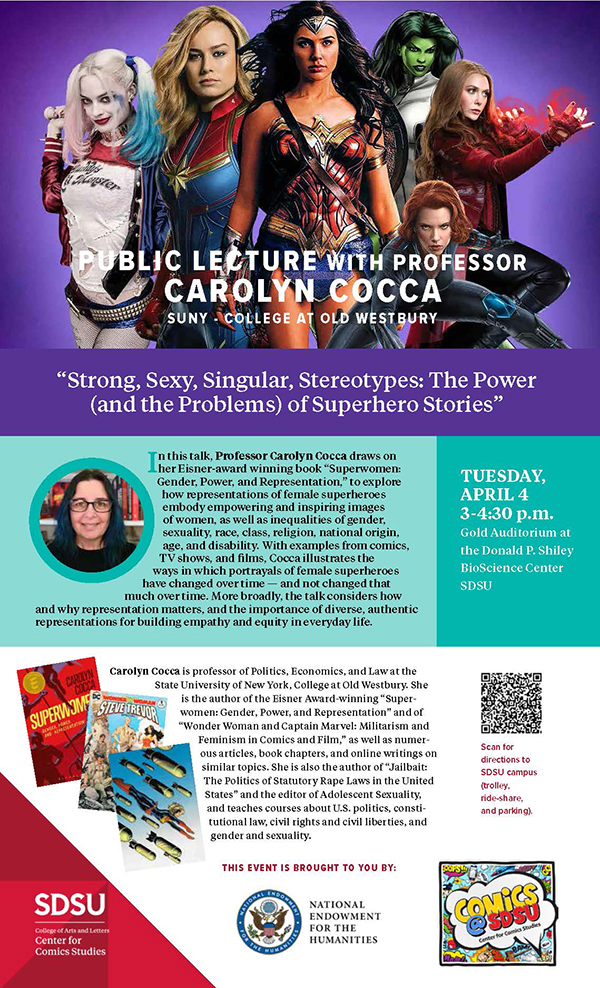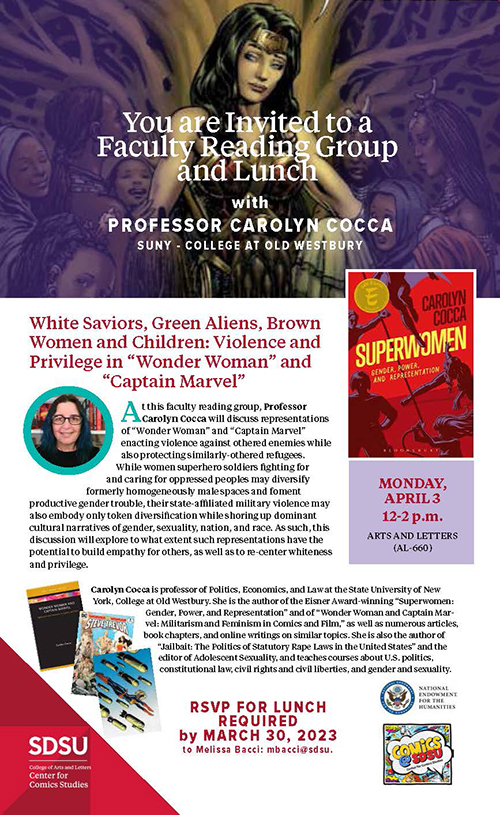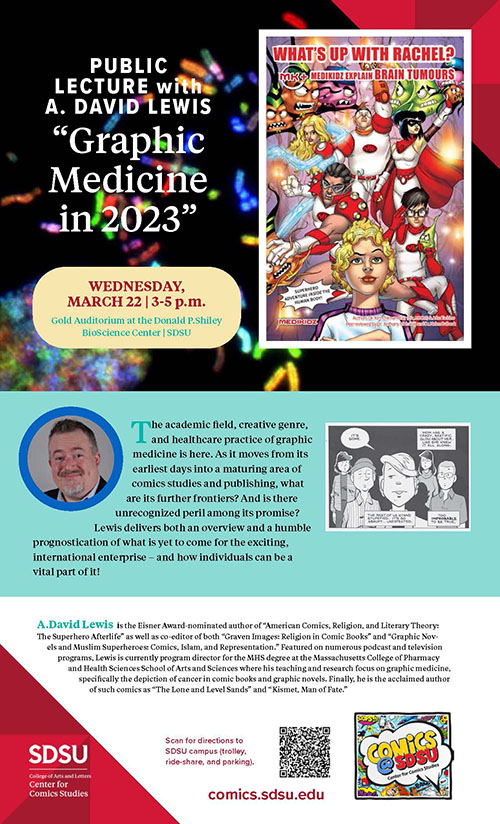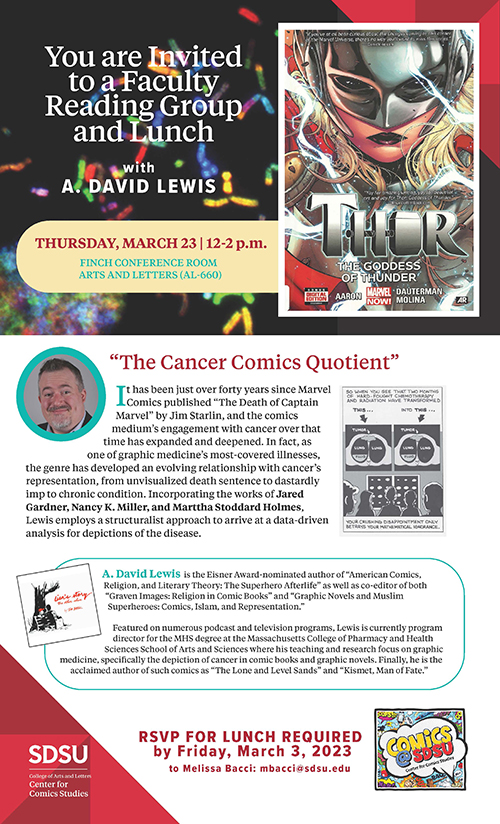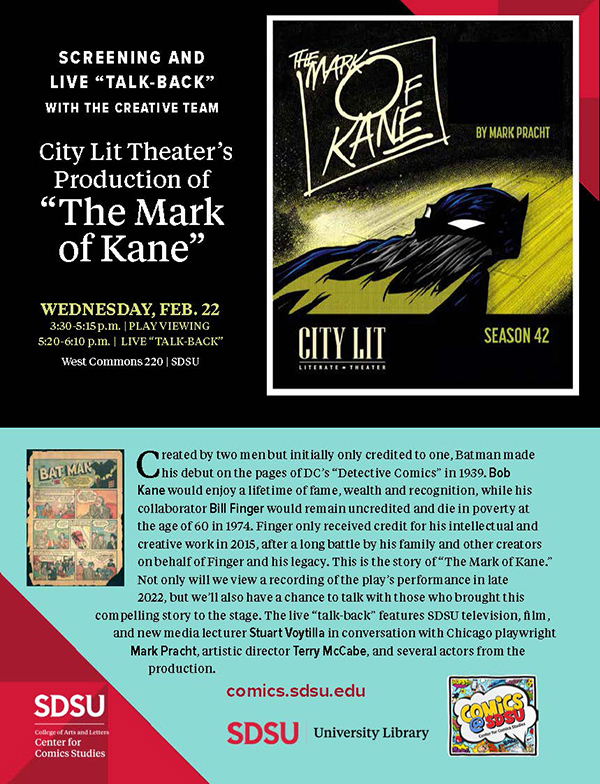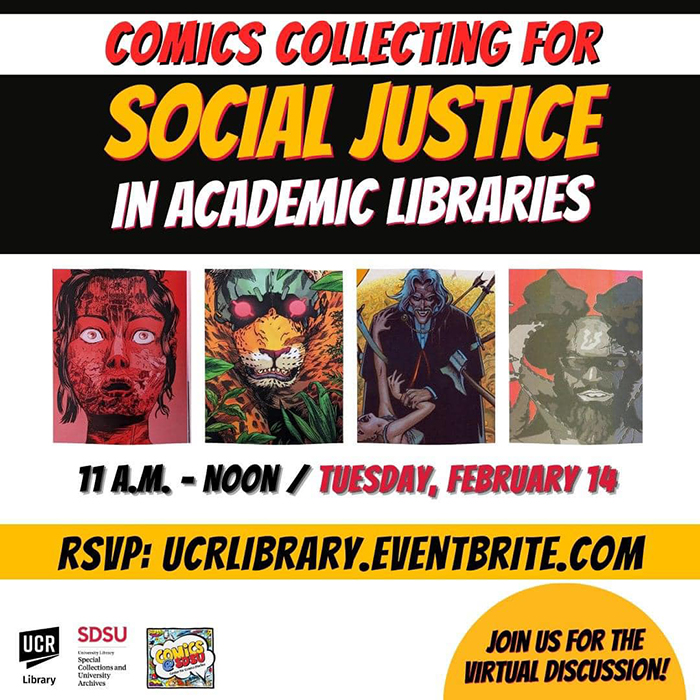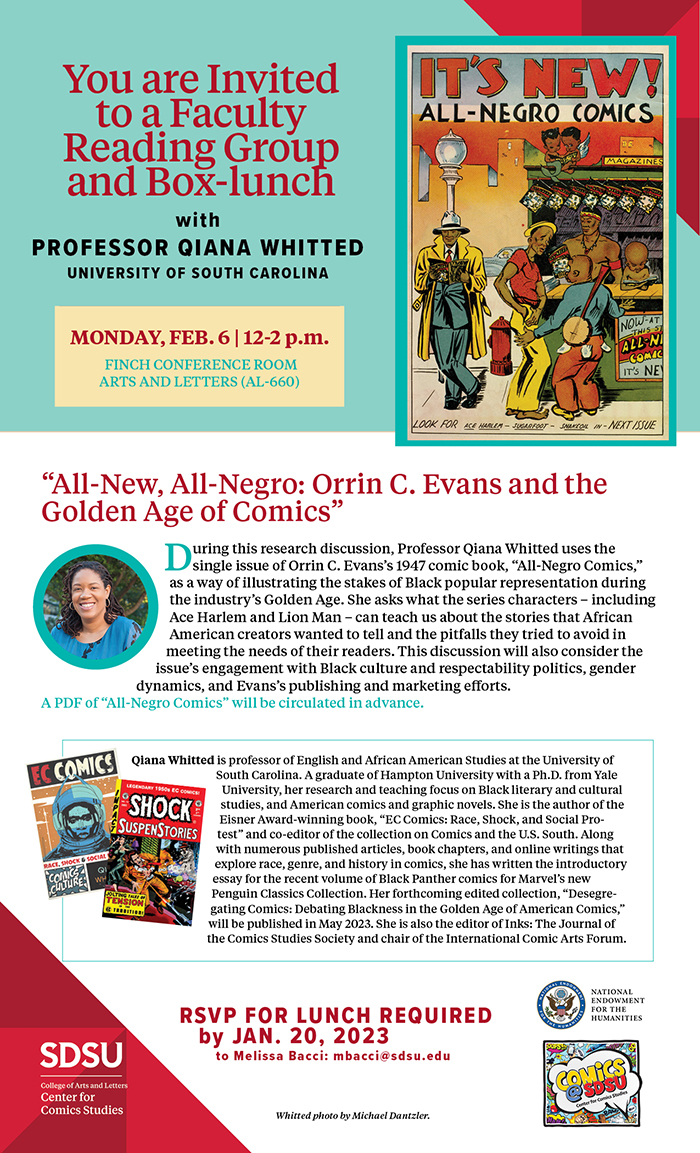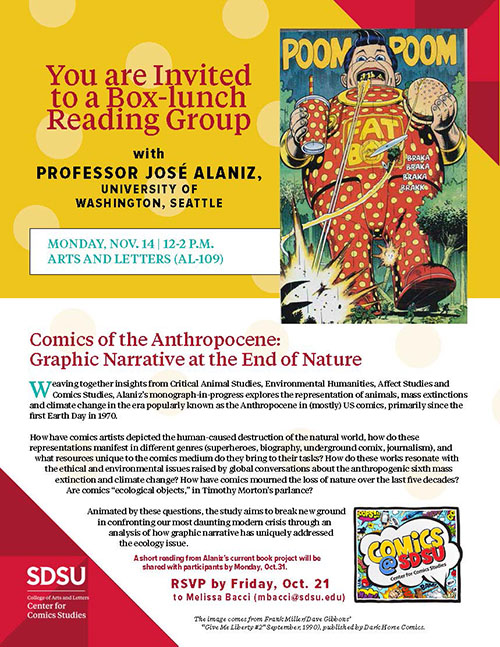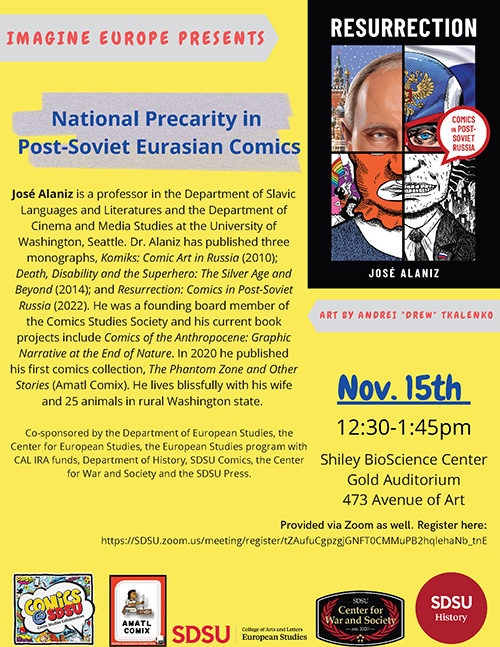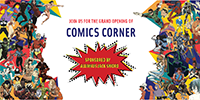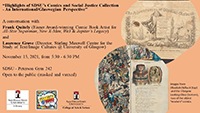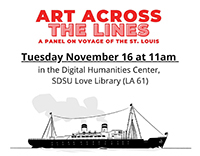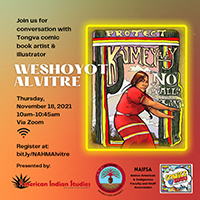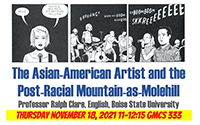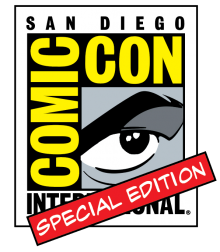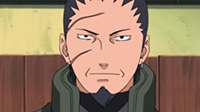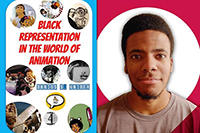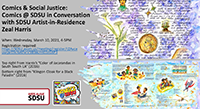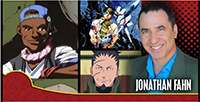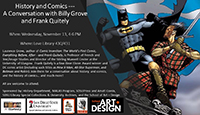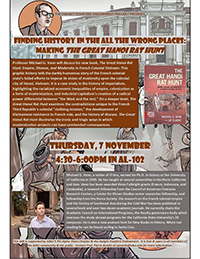
Events
Comics, Bande Dessinée, Fumetti, and Manga - Comics in Many Forms
Saturday, November 22, 2025
1-2 p.m.
at the Comic-Con Museum
Join us for a conversation about comics in their many forms. Vin Deighan (aka Frank Quitely), Lawrence Grove (Director of the Stirling Maxwell Centre for the Study of Text/Image Cultures at the University of Glasgow and President of the International Bande Dessinée Society), Antonio Ianotta (University of San Diego), and Van Tarpley (San Diego State University) will join moderator Elizabeth Pollard (Co-Director, Center for Comics Studies at SDSU) for a discussion about the similarities and differences of English-language comics, French bande dessinée, Italian fumetti, and Japanese manga. Free museum admission to the first 40 SDSU students (with current SDSU-ID).
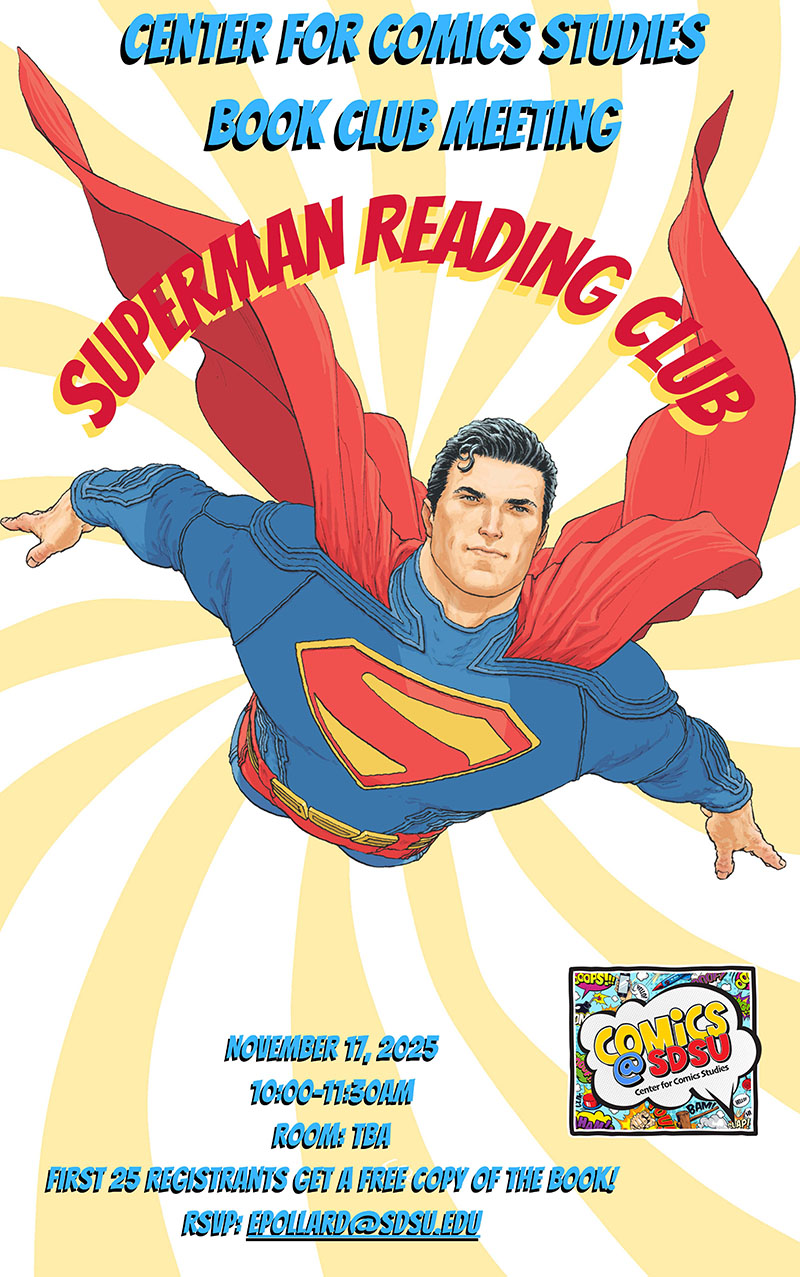 All-Star Superman - Comics Faculty Reading Group
All-Star Superman - Comics Faculty Reading Group
Monday, November 17, 2025
10-11:30 a.m.
in AL 625 (and Hybrid, via Zoom)
Join us for a moderated book discussion of All-Star Superman (Morrison, Quitely, and Grant). Vin Deighan (aka Frank Quitely), Scottish comic-book artist and SDSU’s 2025 Visiting Comics Professional in Residence, will be on-hand for the discussion of this award-winning graphic novel: Eisner for “Best New Series” (2026) and “Best Continuing Series (2007 and 2009); “Best Artist” Harvey Award (2008); and Eagle Award for “Favorite New Comic Book” (2007).
Contact [email protected] for Zoom link for Hybrid session.
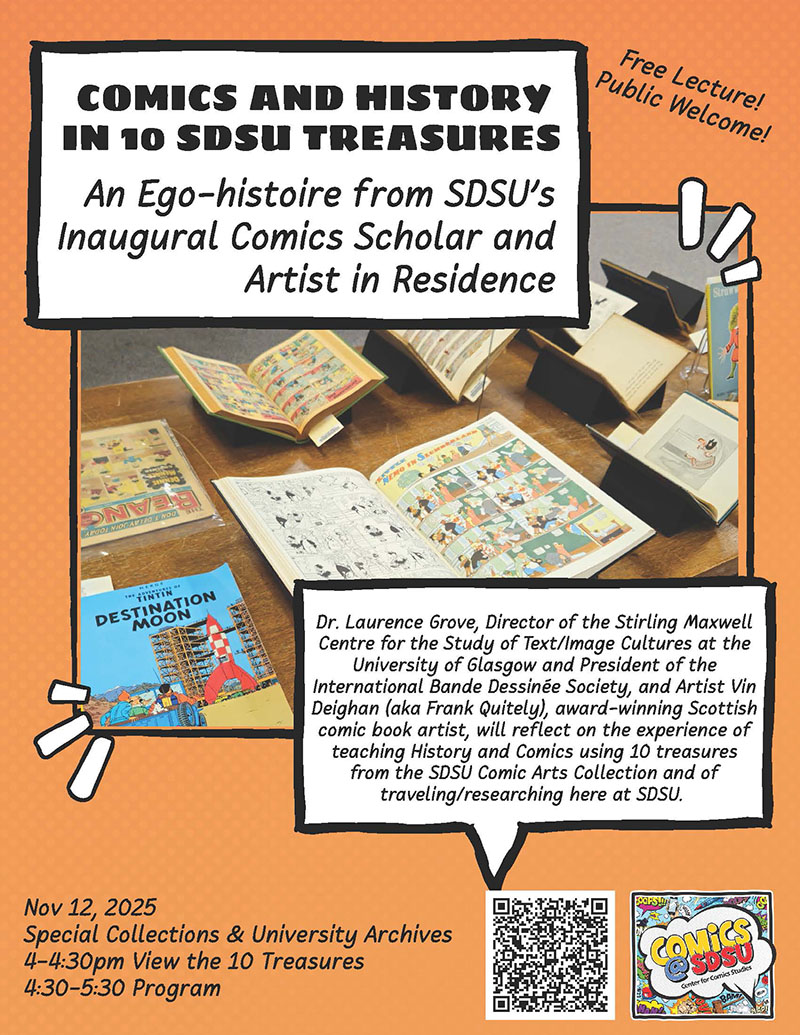 Comics and History in 10 SDSU Treasures: An Ego-histoire from SDSU’s Inaugural Comics
Scholar and Artist in Residence
Comics and History in 10 SDSU Treasures: An Ego-histoire from SDSU’s Inaugural Comics
Scholar and Artist in Residence
Wednesday, November 12, 2025
in Special Collections & University Archives (Instruction Lab)
4-4:30 p.m. View the 10 Treasures on display
4:30-5:30 p.m. Program
Laurence Grove, Director of the Stirling Maxwell Centre for the Study of Text/Image Cultures at the University of Glasgow and President of the International Bande Dessinée Society, and Artist Vin Deighan (aka Frank Quitely), award-winning Scottish comic book artist, will reflect on the experience of teaching History and Comics using 10 treasures from the SDSU Comic Arts Collection and of traveling/researching here at SDSU.
Past Events
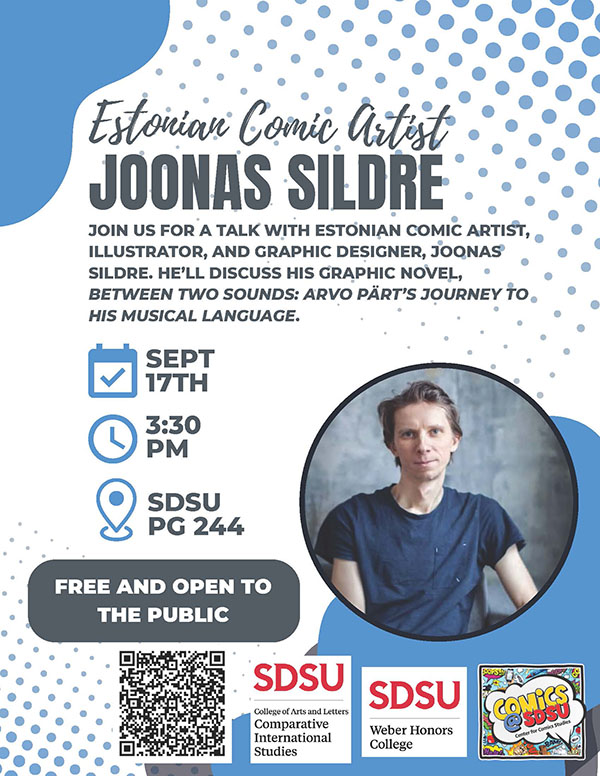 Estonian Comic Artist: Joonas Sildre
Estonian Comic Artist: Joonas Sildre
Wednesday, September 17, 2025
3:30-5 p.m.
in Peterson Gym (PG) 244
Free and Open to the Public
Join us for a talk with Estonian comic artist, illustrator, and graphic designer, Joonas Sildre. We'll discuss his graphic novel, "Between Two Sounds: Arvo Pärt’s Journey to His Musical Language."
Sponsors: The Department of Comparative International Studies, Center for Comics Studies, and Weber Honors College
International Comic Arts Forum (ICAF) Conference: Comics Intersections
April 10-12, 2025
San Diego State University
University Library
Keynote Speaker
Jorge Santos, Jr.
Guest Artists
Mary Fleener
Breena Nuñez
Jose Trinidad Camacho Orozco
For more information, visit the conference website.
“Militarizing Cold War Children”
with Kara Dixon Vuic, LCpl. Benjamin W. Schmidt Professor of War, Conflict, and Society in Twentieth-Century America at Texas Christian University
Thursday, February 13, 2025
12:30-1:45 p.m.
Gold Auditorium, Donald P. Shiley Bioscience Center
Free and Open to the Public
The beginning of the Cold War intensified discussions of citizenship and the role of citizens in American homes and schools. With all of American society expected to defend the nation against threats both internal and domestic, everyone had a part to play. Young girls and boys found their lives under great scrutiny, but also of profound national significance. We’ll consider how Americans raised Cold War warriors, in the home, in schools, and in the community. “Bert the Turtle”* was very alert, but so were parents, educators, and much of American institutions and culture.
*”Bert the Turtle” was created in 1952 by Raymond J. Mauer and Anthony Rizzo.
Sponsors: Center for War and Society and Center for Comics Studies
Rising Up: Depictions of Social Protest in Comics
March - December 2024
Grand Opening event on March 12 at 4 p.m.
On Display in the SDSU Special Collections & University Archives Gallery, 1st Floor of Love Library
Curated by Pamela Jackson, SDSU Comic Arts Librarian and Co-Director of the Center for Comics Studies
Social protest has been a recurring theme in comic books, with many writers and artists using the medium to express their political views and social commentary. The comics on display in this year-long exhibit depict different types of protests on a variety of topics, including bodily autonomy, human and civil rights, racial violence, police brutality, antiwar, government policy, environmental issues, fair labor conditions and living wages, and wealth inequality.



“Unaccompanied: Stories of Brave Teenagers Seeking Asylum” – a graphic novel
Public Lecture with Tracy White
Thursday, April 25, 2024, 2-3:15 p.m.
Location: Love Library 430-431 (Leon Williams Room)
Join us for an exploration of resilience, hope, and the art of visual storytelling.
In “Unaccompanied: Stories of Brave Teenagers Seeking Asylum,” Tracy White delves into the harrowing yet inspiring journeys of five teenagers who risk everything to seek safety in the U.S. This talk shares their compelling narratives, pieced together through meticulous interviews, showcasing why emigration often becomes their only hope. White’s insight into the creative process highlights the essential skills for crafting impactful non-fiction stories. She emphasizes the role of graphic novels as powerful tools for empathy and understanding, while addressing the challenge of overcoming implicit bias. Join us for an exploration of resilience, hope, and the art of visual storytelling.
Tracy White is a graphic novelist and teacher. Her current book, “Unaccompanied: Stories of Brave Teenagers Seeking Asylum,” tells the true experiences of courageous teens fleeing their home countries to seek asylum in the U.S. White’s first graphic novel, “How I Made it to Eighteen: A Mostly True Story” was a Bank Street Book of the year, a Yalsa Great Graphic Novel, and a Texas Maverick Graphic Novel. Her webcomics “TRACED” was nominated twice for an Ignatz and was a TV series for Oxygen TV. She teaches comics at NYU’s Tisch School of the Arts.
Sponsored by the Center for Comics Studies, Amatl Press, and Master of Arts in Liberal Arts and Sciences (MALAS).



Using Sequential Art to Tell Stories: Are Comic Books Part of This Native Tradition?
Public Lecture with Chag Lowry
Wednesday, March 20, 2024, 2-3:15 p.m.
Location: Love Library 430-431 (Leon Williams Room)
Chag will discuss the community and cultural vetting process necessary to craft and publish authentic and respectful stories based on Native experiences. He will also explain how his education work among his Native people prepared him to create his comic book imprint called Original Voices. Attendees will learn about Chag’s comic-creating process, including his collaborationwith other artists.
Chag Lowry is of Maidu, Yurok, and Achumawi Native ancestry from northern California. He is the publisher and writer of the comic stories titled: “Where the Water Flows Strong” (art by Weshoyot Alvitre), “Reflections” (art by Eli Hyder),“Follow the Water” (art by Rahsan Ekedal), and “My Sisters” (co-written and art by Weshoyot Alvitre). He is also the author of the award-winning World War I graphic novel “Soldiers Unknown” (art by Rahsan Ekedal) published by Great Oak Press. Chag’s imprint Original Voices also publishes books about California Native American veterans.



City Lit's Innocence of Seduction: Screening and Live Talk-Back with Creative Team
Wednesday, February 21, 2024, 3:30-6:10 p.m.
Location: Love Library 430-431 (Leon Williams Room)
Mark Pracht’s new play, “The Innocence of Seduction,” examines the 1950s congressional investigation into the supposed link between comic books and juvenile delinquency, and the effect of the investigation on the careers of three people: William Gaines, originator of the horror genre of comic books; Matt Baker, a Black closeted gay artist of romance comics; and Janice Valleau, creator of a pioneering woman detective comics feature.
At this screening, we’ll not only view a recording of the play’s world premiere in late 2023, but we’ll also have a chance to talk with those who brought this compelling story to the stage. The live “talk-back” features television, film, and new media lecturer Stuart Voytilla in conversation with the playwright and several actors from the production.


Into the Archives: The Comic Arts Collection at SDSU (Edventure)
Wednesday, February 21, 2024, 9-11 a.m.
This course is offered through the Osher Lifelong Learning Institute for adult learners over the age of 50. $30 course registration fee required.
Would you like to see (and touch!) unique and rare comic books, including the oldest
comic published in the United States? Then join us for a journey through SDSU’s Special
Collections and University Archives Comic Arts Collection! We’ll explore comics that
spark social engagement through topics such as race, gender, ableness, age, and gender
in autobiographical, historical, and superhero comics; take a look at pop culture
ephemera from our archival collections; and peek into the history of the founding
of Comic-Con.
Lalo Alcaraz: One Man Border Crisis
Thursday, February 8, 2024, 11 a.m. -12:15 p.m.
Location: Hepner Hall 150 (limited seating)
Chicano radical cartoonist, Lalo Alcaraz, swoops back to his old stomping grounds, SDSU, for a dynamic presentation focused on LATINO U.S.A., his epic collaborative project with Ilan Stavans, and assorted other semiotic crimes and desmadres perpetrated across the televisual and print media universes. The lecture is free and open to the public; but note that seating is limited (first come, first served).
SDSU Alumni Lalo Alcaraz is an award-winning visual/media artist and television/film writer. A Los Angeles resident, he has been chronicling the ascendancy of Latinos in the U.S. for over a quarter-century. The busy Chicano artist is the creator of the syndicated daily comic strip La Cucaracha seen in the L.A. Times and other newspapers nationwide. Alcaraz is founder and Jefe-in-Chief of POCHO, which started out as a Xeroxed zine in the last century and now ranks a leading Latino satire website. A prolific political cartoonist, Lalo is the winner of six Los Angeles Press Club awards for Best Editorial Cartoon. He was an editorial cartoonist for the L.A. Weekly from 1992-2010 and now creates editorial cartoons in English and Spanish for Andrews McMeel Syndication. Daily Kos, and various newspapers, including Philadelphia's Al Dia News. His work has appeared on 60 Minutes, CBS News, NBC, Univision, and in hundreds of publications. Lalo's graphic novel and cartoon books include the New York Times bestseller A Most Imperfect Union, Latino USA: A Cartoon History. 15th Anniversary Edition; Migra Mouse: Political Cartoons On Immigration; and La Cucaracha. Author of the forthcoming graphic history novel, UNIDOS, about the historic civil rights group formerly known as the National Council of La Raza (now UnidosUS), Lalo is also a highly sought-after Hollywood consultant and producer.
Sponsored by the Center for Comics Studies, Amatl Press, and Master of Arts in Liberal
Arts and Sciences (MALAS).
Kids at War: Jack Kirby’s Mythology of Boyness
Wednesday, November 8, 2023, 4:00-5:30 p.m.
Location: Love Library 430-431 (Leon Williams Presentation Room)
Long before he designed the Marvel Universe, Jack Kirby helped mythologize American boyhood. Kirby’s 1940s “kid gang” comics with Joe Simon tapped his boyhood memories while channeling anxious social myths about boys’ propensity for delinquency and violence. What happened to the “boy” gang formula under the pressure of World War II, and how did those comics pave the way for Kirby’s later work? Join us for a lively conversation with Charles Hatfield about this influential yet now neglected genre
Charles Hatfield (CSU Northridge), author of Hand of Fire: The Comics Art of Jack Kirby (2012) and Alternative Comics (2005) and coeditor of Comics Studies: A Guidebook (2020), co-founded the Comics Studies Society and has been active in the field for nearly thirty years.
This event is brought to you by: National Endowment for the Humanities.
Making Reading Strange Again, or, Is Comics Literacy Its Own Thing?
Faculty Reading Group amd Lunch with Visiting Scholar Charles Hatfield
Thursday, November 9 | 11:30 a.m.- 1:30 p.m.
Finch Conference Room (6th Floor) Arts & Letters
Though often belittled as “simple,” comics is an uncanny mode of reading that may confound even experienced readers: a distinctive mode of literacy that has a complex, unresolved relationship to traditional alphabetic literacy. Far from a neutral conveyor of ideas that could be expressed as readily in words alone, comics offers a resistant mode of reading. This talk with Charles Hatfield will engage the question “What is comics literacy?” by analyzing the reading challenges implicit in several contrasting examples drawn from contemporary comics.
This event is brought to you by: National Endowment for the Humanities.
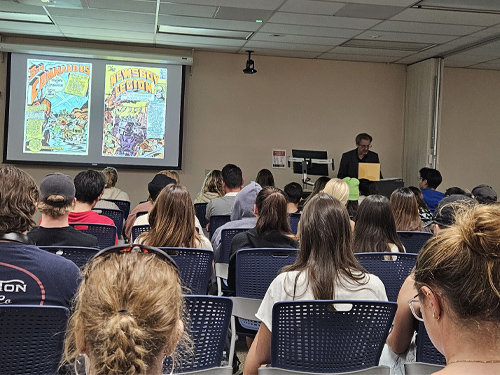
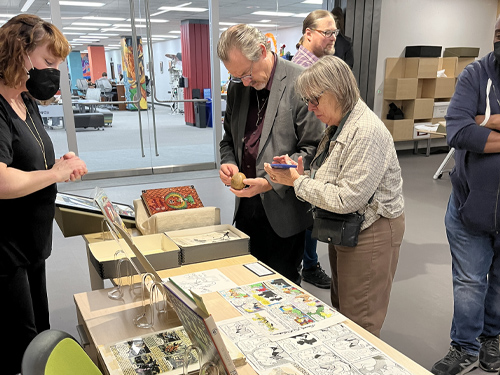
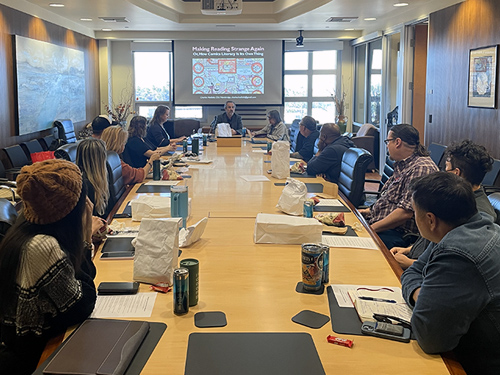
Spotlight on Marcelo D’Salete
Thursday, October 12, 2023, 3:30-4:45 p.m.
Location: Peterson Gym (PG) 242
Brazilian comic creator Marcelo D’Salete has produced multiple graphic novels that explore the brutal history and painful long-term consequences of slavery in Brazil. "Cumbe / Run for It" (2014), "Angola Janga: Kingdom of Runaway Slaves" (2017), and most-recently "Mukanda Tiodora" (2022) offer poignant and well-researched explorations of the experience of enslaved Afro-Brazilian people across centuries.
SDSU’s Center for Comics Studies and the Behner Stiefel Center for Brazilian Studies have collaborated to host Eisner Award winning D’Salete for a wide-ranging conversation about his work.
Prof. Daniela Gomes will translate this event, which will take place in English and
Portuguese.
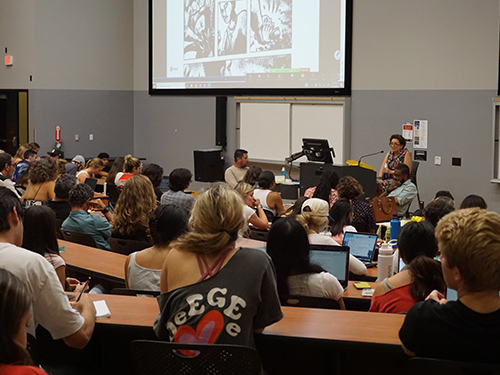
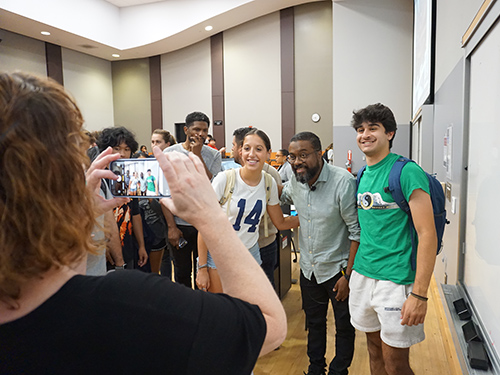
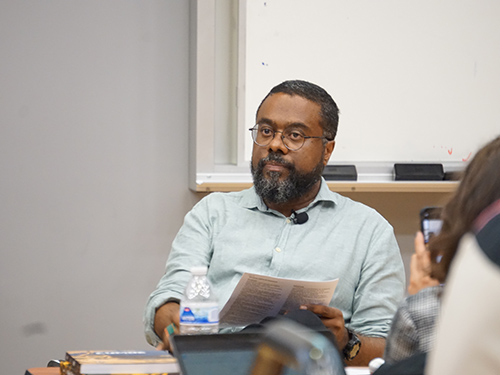
“Legalize Positivity”: Comics, the Prison Industrial Complex, and HIV/AIDS Education
Thursday, Sept. 28, 4-5:30 p.m.
Arts and Letters 104 or on Zoom
Queering Comics (LGBT 550), a course developed with the support of the Center's NEH "Building a Comics and Social Justice Curriculum" grant, invites you to join their upcoming event featuring Inés Ixierda and Clio Reese Sady.
They will discuss their comic "Legalize Positivity," which was part of the 2020 StripAIDS exhibit. The exhibit uses comics to share information about HIV/AIDS. Ixierda and Sady's comic focuses on how people with HIV/AIDS have been criminalized as part of the growth of the prison industrial complex.
Clio Reese Sady (AKA Thatcher) is a cartoonist and former tattoo artist living on unceded Ramaytush Ohlone land in San Francisco, California. Inés Ixierda is a queer Mestisx interdisciplinary visual artist and media maker in Oakland, California, unceded Ohlone Territory.
Part of the Bread and Roses Speakers Series on “Abolition Feminism”
Sponsored by the Department of Women's Studies, Center for Comics Studies, and Master of Arts in Liberal Arts and Sciences (MALAS).
When Comic-Book Worlds Collide: Word Balloons in Pacific Review
September 12-21
San Diego State University, Everett Gee Jackson Gallery
The exhibition showcases the best student comics created in artist/ lecturer Neil Kendricks' ART 215: Visual Odyssey through Comics and Sequential Media class and artist/ professor Neil Shigley's ART 343: Illustration and ART 443: Illustration classes during San Diego State University's 2022-2023 academic year.
Featuring comic-book art by Alexa Ariizumi, Paloma Burner, Lucky Dasari, Lukas Fuster, Cassandra Jordan, Bradley Medina, Natalia Paredes, Christopher Reynoso, and Breanna ''Nana'' Rohde. Curated by Neil Kendricks
Most of the exhibition's comics were published in SDSU's Pacific Review literary journal's first-time-ever ''Graphic Edition'' in 2023. The students' comics will also be published in a forthcoming issue of Word Balloons, the SDSU comics anthology edited by Kendricks and Shigley.
Comics@SDSU at Comic-Con, International 2023
July 19-23, 2023
Researchers from across colleges and within the Center for Comics Studies at San Diego State University will share their knowledge — and the stage — at the annual San Diego Comic-Con. Scientists, artists, librarians, and historians will come together to showcase research on topics of social and racial justice, activism, science, and academics, all tied to comics.
Strong, Sexy, Singular, Stereotypes: The Power (and the Problems) of Superhero Stories
Public Lecture with Professor Carolyn Cocca, Suny - College at Old Westbury
Tuesday, April 4 | 3-4:30 p.m.
Gold Auditorium at the Donald P. Shiley, BioScience Center
In this talk, Professor Carolyn Cocca draws on her Eisner award-winning book “Superwomen: Gender, Power, and Representation,” to explore how representations of female superheroes embody empowering and inspiring images of women, as well as inequalities of gender, sexuality, race, class, religion, national origin, age, and disability. With examples from comics, TV shows, and films, Cocca illustrates the ways in which portrayals of female superheroes have changed over time — and not changed that much over time. More broadly, the talk considers how and why representation matters, and the importance of diverse, authentic representations for building empathy and equity in everyday life.
Carolyn Cocca is a professor of Politics, Economics, and Law at the State University of New York, College at Old Westbury. She is the author of the Eisner Award-winning “Superwomen: Gender, Power, and Representation” and of “Wonder Woman and Captain Marvel: Militarism and Feminism in Comics and Film,” as well as numerous articles, book chapters, and online writings on similar topics. She is also the author of “Jailbait: The Politics of Statutory Rape Laws in the United States” and the editor of Adolescent Sexuality and teaches courses about U.S. politics, constitutional law, civil rights and civil liberties, and gender and sexuality.
This event is brought to you by: National Endowment for the Humanities.
Read the SDSU NewsCenter article on Cocca's visit.
White Saviors, Green Aliens, Brown Women and Children: Violence and Privilege in “Wonder Woman” and “Captain Marvel”
Faculty Reading Group amd Lunch with Visiting Scholar Carolyn Cocca
Monday, April 3 | 12-2 p.m.
Arts And Letters (AL-660)
At this faculty reading group, Professor Carolyn Cocca will discuss representations of “Wonder Woman” and “Captain Marvel” enacting violence against othered enemies while also protecting similarly-othered refugees. While women superhero soldiers fighting for and caring for oppressed peoples may diversify formerly homogeneously male spaces and foment productive gender trouble, their state-affiliated military violence may also embody only token diversification while shoring up dominant cultural narratives of gender, sexuality, nation, and race. As such, this discussion will explore to what extent such representations have the potential to build empathy for others, as well as to re-center whiteness and privilege.
This event is brought to you by: National Endowment for the Humanities.
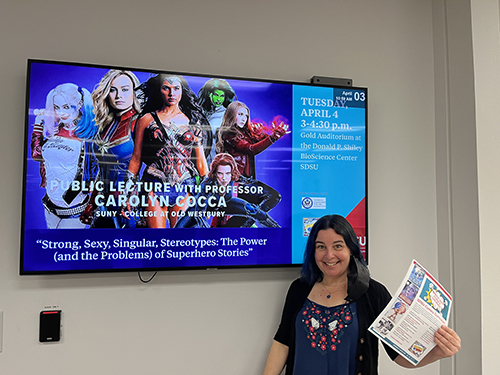
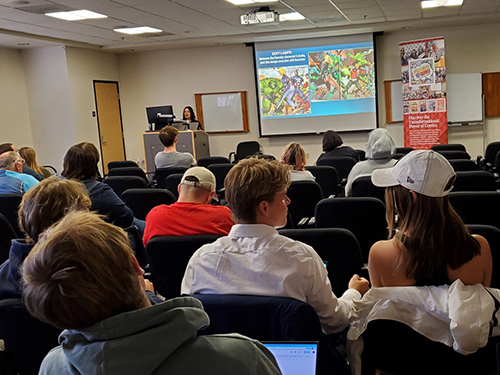
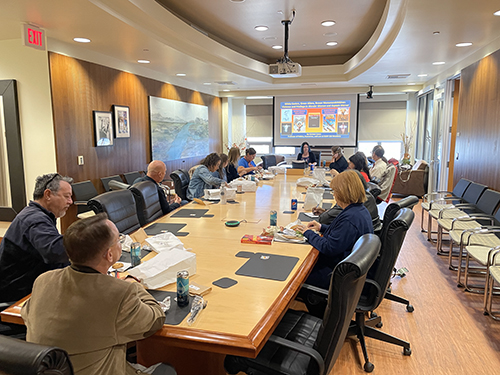
Graphic Medicine in 2023
Public Lecture with A. David Lewis
Wednesday, March 22 | 3-5 p.m.
Gold Auditorium at the Donald P. Shiley BioScience Center, SDSU
The academic field, creative genre, and healthcare practice of graphic medicine is here. As it moves from its earliest days into a maturing area of comics studies and publishing, what are its further frontiers? And is there unrecognized peril among its promise? Lewis delivers both an overview and a humble prognostication of what is yet to come for the exciting, international enterprise – and how individuals can be a vital part of it!
A. David Lewis is the Eisner Award-nominated author of “American Comics, Religion, and Literary Theory: The Superhero Afterlife” as well as co-editor of both “Graven Images: Religion in Comic Books” and “Graphic Novels and Muslim Superheroes: Comics, Islam, and Representation.”
Featured on numerous podcast and television programs, Lewis is currently program director for the MHS degree at the Massachusetts College of Pharmacy and Health Sciences School of Arts and Sciences where his teaching and research focus on graphic medicine, specifically the depiction of cancer in comic books and graphic novels. Finally, he is the acclaimed author of such comics as “The Lone and Level Sands” and “Kismet, Man of Fate.”
The Cancer Comics Quotient
Faculty Reading Group amd Lunch with Visiting Scholar David Lewis
Thursday, March 23 | 12-2 p.m.
Arts and Letters 660
It has been just over forty years since Marvel Comics published “The Death of Captain
Marvel” by Jim Starlin, and the comics medium’s engagement with cancer over that time
has expanded and deepened. In fact, as one of graphic medicine’s most-covered illnesses,
the genre has developed an evolving relationship with cancer’s representation, from
unvisualized death sentence to dastardly imp to chronic condition. Incorporating the
works of Jared Gardner, Nancy K. Miller, and Marttha Stoddard Holmes, Lewis employs
a structuralist approach to arrive at a data-driven analysis for depictions of the
disease.
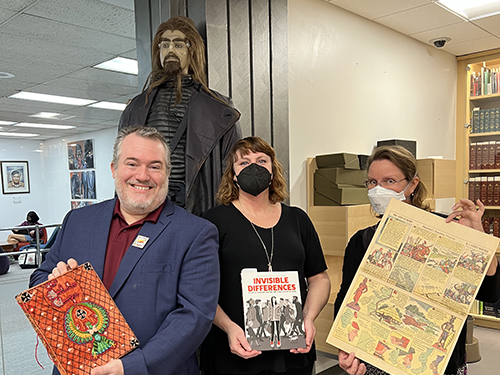
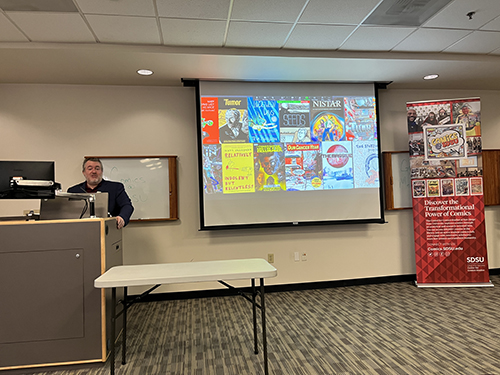
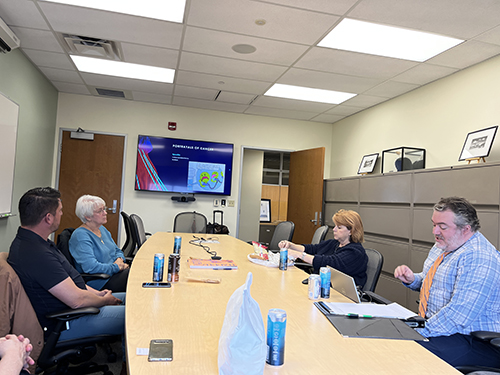
From Cave Paintings to Comics: A Brief History of Animation
When/Where: Saturday, February 25, 2022 from 2-3PM at Comic-Con Museum in Balboa Park
Tickets at comic-con.org/museum. Free with musuem admission.
Delve deeper into the newly-opened Animation Academy exhibit at the San Diego Comic-Con Museum. Local teachers and artists come together to share their insights into the storied history of animation across human civilizations. What is the oldest example of animation? Why are comics important? How do artists use animation across a variety of genres? Panelists include SDSU's Beth Pollard (Center for Comics Studies), Amanda Lanthorne (University Archivist), and Neil Kendricks (artist and filmmaker), along with TJ Shevlin (Upper Deck, Little Fish Comic Book Studio).
Audience questions encouraged!
Hosted by the San Diego Comic-Con Museum and Fleet Science Center as part of the Pop
Culture Science panel series.
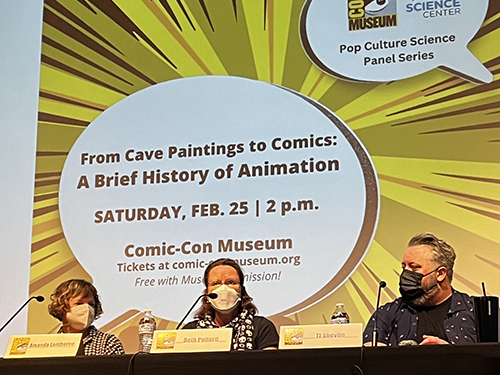
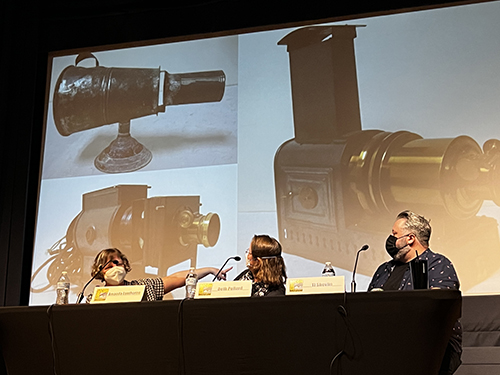
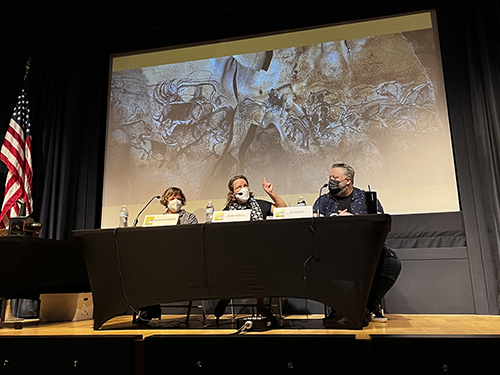
Screening and Live “Talk-Back” with The Creative Team
City Lit Theater’s Production of “The Mark of Kane”
Wednesday, Feb. 22
3:30-5:15 p.m. | PLAY VIEWING
5:20-6:10 p.m. | LIVE “TALK-BACK”
West Commons 220
Created by two men but initially only credited to one, Batman made his debut on the
pages of DC’s “Detective Comics” in 1939. Bob Kane would enjoy a lifetime of fame,
wealth and recognition, while his collaborator Bill Finger would remain uncredited
and die in poverty at the age of 60 in 1974. Finger only received credit for his intellectual
and creative work in 2015, after a long battle by his family and other creators on
behalf of Finger and his legacy. This is the story of “The Mark of Kane.” Not only
will we view a recording of the play’s performance in late 2022, but we’ll also have
a chance to talk with those who brought this compelling story to the stage. The live
“talk-back” features SDSU television, film, and new media lecturer Stuart Voytilla
in conversation with Chicago playwright Mark Pracht, artistic director Terry McCabe,
and several actors from the production.
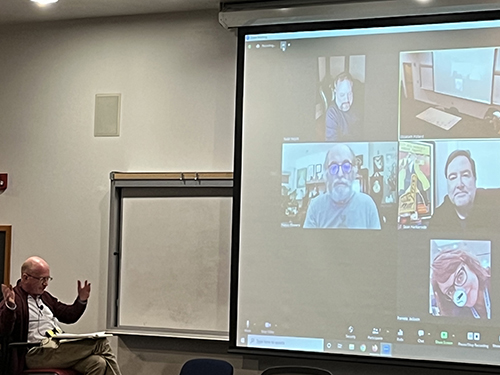
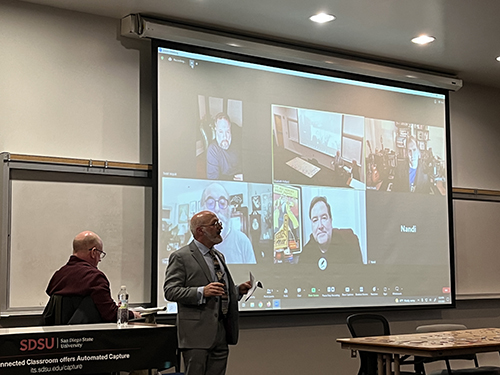
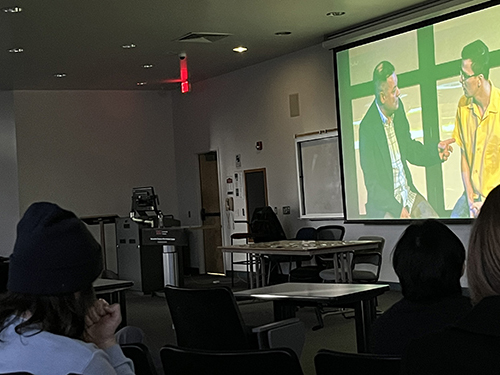
Comics Collecting for Social Justice in Academic Libraries
Tuesday, Feb 14 | 11 a.m. – noon
RSVP: ucrlibrary.eventbrite.com
Join librarians and archivists from San Diego State University and the University of California, Riverside, and find out about their amazing comic collections!
SDSU's Center for Comics Studies and UCR's Eaton Collection of Science Fiction and Fantasy are major research centers for comics and graphic novels: from Marvel to Image Comics, the illustrated adaptations of John Jennings to the innovative work of Somos Arte, LLC, and many others.
This hour-long presentation and discussion will showcase some of the exciting new directions comics curation - and scholarship - is taking at UCR and SDSU, with a special focus on Afrofuturist, Latinx and Indigenous comics and creators.
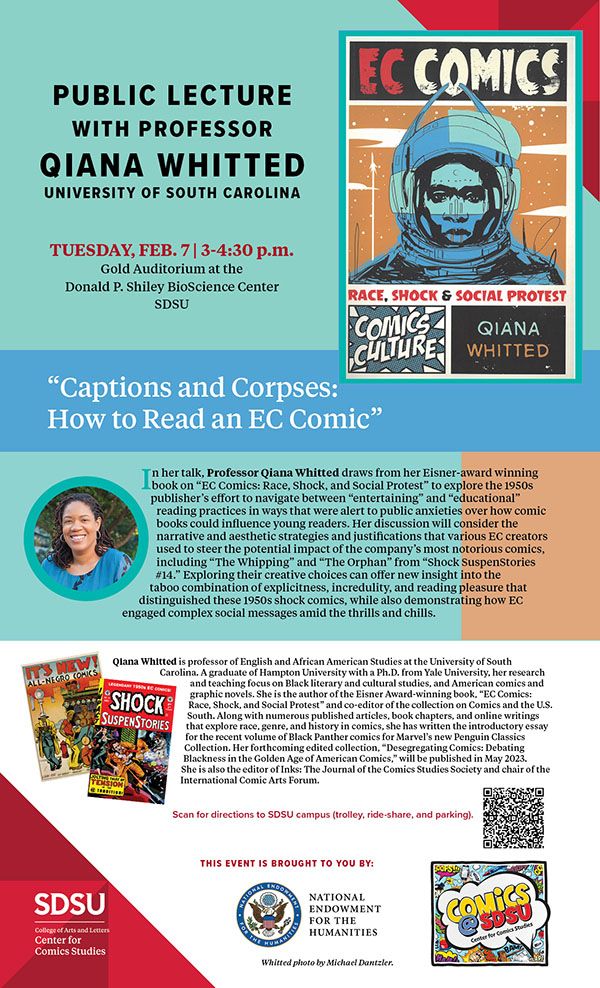 Captions and Corpses: How to Read an EC Comic
Captions and Corpses: How to Read an EC Comic
Public Lecture with Professor Qiana Whitted, University of South Carolina
Tuesday, Feb. 7 | 3-4:30 p.m.
Gold Auditorium at the Donald P. Shiley BioScience Center, SDSU
In her talk, Professor Qiana Whitted draws from her Eisner-award winning book on “EC Comics: Race, Shock, and Social Protest” to explore the 1950s publisher’s effort to navigate between “entertaining” and “educational” reading practices in ways that were alert to public anxieties over how comic books could influence young readers. Her discussion will consider the narrative and aesthetic strategies and justifications that various EC creators used to steer the potential impact of the company’s most notorious comics, including “The Whipping” and “The Orphan” from “Shock SuspenStories #14.” Exploring their creative choices can offer new insight into the taboo combination of explicitness, incredulity, and reading pleasure that distinguished these 1950s shock comics, while also demonstrating how EC engaged complex social messages amid the thrills and chills.
Qiana Whitted is professor of English and African American Studies at the University of South Carolina. A graduate of Hampton University with a Ph.D. from Yale University, her research and teaching focus on Black literary and cultural studies, and American comics and graphic novels. She is the author of the Eisner Award-winning book, “EC Comics: Race, Shock, and Social Protest” and co-editor of the collection on Comics and the U.S. South. Along with numerous published articles, book chapters, and online writings that explore race, genre, and history in comics, she has written the introductory essay for the recent volume of Black Panther comics for Marvel’s new Penguin Classics Collection. Her forthcoming edited collection, “Desegregating Comics: Debating Blackness in the Golden Age of American Comics,” will be published in May 2023. She is also the editor of Inks: The Journal of the Comics Studies Society and chair of the International Comic Arts Forum.
This event is brought to you by: National Endowment for the Humanities.
Read the news stories: The San Diego Union Tribune | KPBS | SDSU NewsCenter
All-New, All-Negro: Orrin C. Evans and the Golden Age of Comics
Faculty Reading Group amd Lunch with Visiting Scholar Qiana Whitted
Monday, Feb 6 | 12-2 p.m.
Arts & Letters 660
Faculty reading/lunch group with Qiana Whitted, Eisner Award winning author of "EC Comics: Race, Shock, and Social Protest."
During this research discussion, Professor Qiana Whitted uses the single issue of Orrin C. Evans’s 1947 comic book, “All-Negro Comics,” as a way of illustrating the stakes of Black popular representation during the industry’s Golden Age. She asks what the series characters – including Ace Harlem and Lion Man – can teach us about the stories that African American creators wanted to tell and the pitfalls they tried to avoid in meeting the needs of their readers. This discussion will also consider the issue’s engagement with Black culture and respectability politics, gender dynamics, and Evans’s publishing and marketing efforts.
This event is brought to you by: National Endowment for the Humanities.
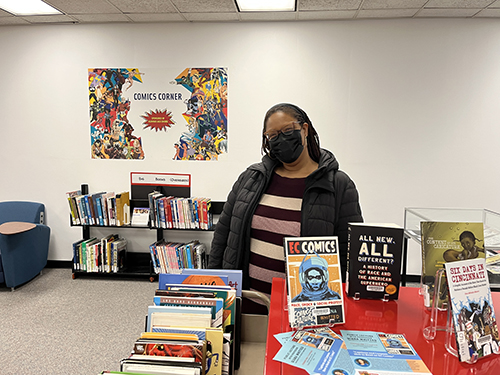
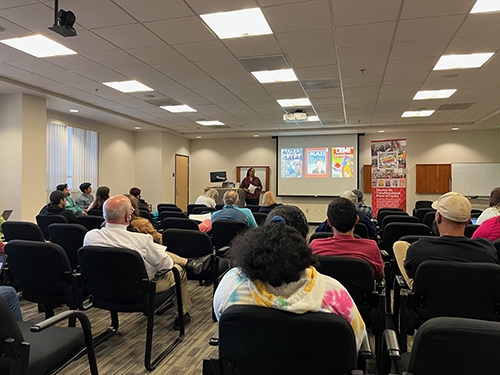
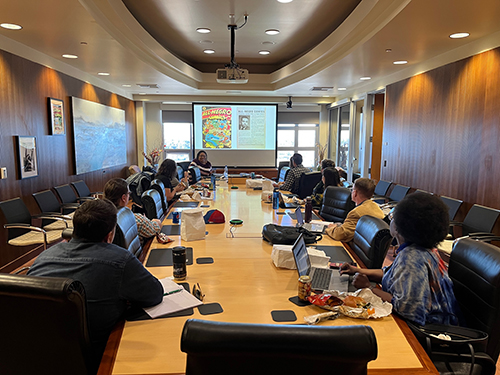
Comics of the Anthropocene: Graphic Narrative at the End of Nature
Box-lunch Reading Group with Professor José Alaniz, University of Washington, Seattle
Monday, Nov. 14 | 12-2 p.m.
Arts and Letters (AL-109)
Weaving together insights from Critical Animal Studies, Environmental Humanities, Affect Studies and Comics Studies, Alaniz’s monograph-in-progress explores the representation of animals, mass extinctions and climate change in the era popularly known as the Anthropocene in (mostly) US comics, primarily since the first Earth Day in 1970.
How have comics artists depicted the human-caused destruction of the natural world, how do these representations manifest in different genres (superheroes, biography, underground comix, journalism), and what resources unique to the comics medium do they bring to their tasks? How do these works resonate with the ethical and environmental issues raised by global conversations about the anthropogenic sixth mass extinction and climate change? How have comics mourned the loss of nature over the last five decades? Are comics “ecological objects,” in Timothy Morton’s parlance?
Animated by these questions, the study aims to break new ground in confronting our
most daunting modern crisis through an analysis of how graphic narrative has uniquely
addressed the ecology issue.
National Precarity in Post-Soviet Eurasian Comics
Tuesday, Nov. 15, 2022 | 12:30-1:45 p.m.
Gold Auditorium, Shiley Bioscience Center
José Alaniz is a professor in the Department of Slavic Languages and Literatures and the Department of Cinema and Media Studies at the University of Washington, Seattle. Dr. Alaniz has published three monographs, Komiks: Comic Art in Russia (2010); Death, Disability and the Superhero: The Silver Age and Beyond (2014); and Resurrection: Comics in Post-Soviet Russia (2022). He was a founding board member of the Comics Studies Society and his current book projects include Comics of the Anthropocene: Graphic Narrative at the End of Nature. In 2020 he published his first comics collection, The Phantom Zone and Other Stories (Amati Comix). He lives blissfully with his wife and 25 animals in rural Washington state.
Co-sponsored by the Department of European Studies, the Center for European Studies,
the European Studies program with CAL IRA funds, Department of History, Center for
Comics Studies, the Center for War and Society and the SDSU Press.
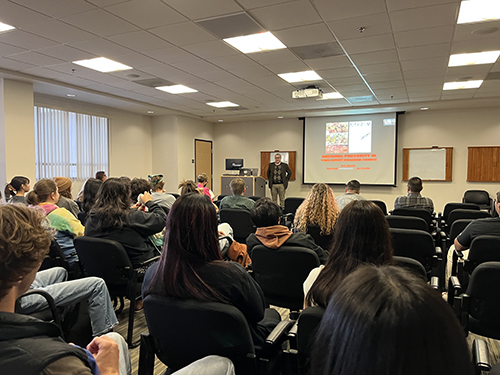
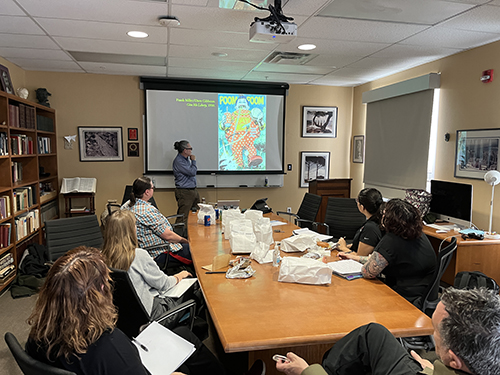
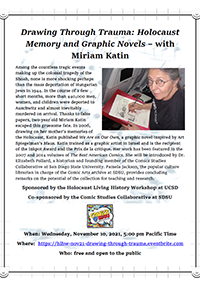 Drawing Through Trauma: Memory and Graphic Novels with Miriam Katin
Drawing Through Trauma: Memory and Graphic Novels with Miriam Katin
Wednesday, November 10, 2021 | 5-6:30 pm
Among the countless tragic events making up the colossal tragedy of the Shoah, none is more shocking perhaps than the mass deportation of Hungarian Jews in 1944. In the course of a few short months, more than 440,000 men, women, and children were deported to Auschwitz and almost inevitably murdered on arrival. Thanks to false papers, two-year old Miriam Katin escaped this gruesome fate. In 2006, drawing on her mother’s memories of the Holocaust, Katin published We Are on Our Own, a graphic novel inspired by Art Spiegelman’s Maus. Katin trained as a graphic artist in Israel and is the recipient of the Inkpot Award and the Prix de la critique. Her work has been featured in the 2007 and 2014 volumes of The Best American Comics. She will be introduced by Dr. Elizabeth Pollard, a historian and founding member of the Comics Studies Collaborative at San Diego State University. Pamela Jackson, the popular culture librarian in charge of the Comic Arts archive at SDSU, provides concluding remarks on the potential of the collection for teaching and research.
Co-sponsored with the Holocaust Living History Workshop at UCSD
Comics Corner Grand Opening, honoring Jack Sword
Friday, November 12, 2021 | 1-2 pm
Brief showcase of treasures from the SDSU Library Comic Arts Collection, followed
by a ribbon cutting and presentation to the donor.
Highlights of SDSU’s Comics and Social Justice Collection - An International/Glaswegian Perspective
Monday, November 15, 2021 | 5:30-6:30 pm
A conversation with
Frank Quitely (Eisner Award-winning Comic Book Artist for All-Star Superman, New X-Men, We3 & Jupiter's Legacy)
and
Laurence Grove (Director, Stirling Maxwell Centre ofr the Study of Text/Image Cultures at the University
of Glasgow)
Preview of San Diego Italian Film Festival Event - Art Across the Lines Voyage of the St. Louis
Tuesday, November 16, 2021 | 11 am-12 pm
Panel discussion by Antony Shugaar (translator from the Italian and Red Car Press publisher), Alonso Nunez (Little Fish Comic Book Studio) and Antonio Iannotta (Artistic Director of the San Diego Italian Film Festival); Moderated by Beth Pollard (History and Comics@SDSU)
Co-Sponsored with the Italian Studies Program, Department of European Studies, and
the Center for European Studies.
A Conversation with Weshoyot Alvitre
Thursday, November 18, 2021 | 9:45 - 10:45 am
Weshoyot Alvitre is a Tongva (Los Angeles Basin) and Scottish comic book artist and illustrator. Weshoyot has been working in the comics medium for over 15 years and has since contributed to numerous Eisner award-winning books, including the “Umbrella Academy” (Darkhorse Comics), “Little Nemo: Dream Another Dream” (Locust Moon Press) and "Little Bird" (Image Comics).
Co-Sponsored with American Indian Studies, SDSU Native Resources Center, NAIFSA
The Asian-American Artist and the Post-Racial Mountain-as-Molehill
Thursday, November 18, 2021 | 11:00 am -12:15 pm
Dr. Ralph Clare (Associate Professor of English at Boise State University) Lecture on Adrian Tomine’s Shortcoming's
Cosponsored by Amatl Comix, SDSU Press, Hyperbole Books, and MALAS
Archaeology in 1950s Comic Books
Friday, November 19, 2021 | 7:15-8:45 pm
Lecture by Prof. E.A. Pollard (SDSU)
Co-Sponsored with the San Diego Society of the Archaeological Institute of America
San Diego Comic Con Special Edition
CBLDF: Civic Engagement and Comics
Friday, November 26, 2021 | 2-3 pm
The past few years have represented a sea change in how people engage with their communities, with vital exercises of First Amendment rights in protests and the art that rises around them. As with many artistic endeavors, civic engagement has been an integral part of comics since the format’s origin, addressing issues as diverse as women’s rights, civil rights, LGBTQ+ representation, antiracism, and so much more. Panelists explore how comics have been used to address social and political issues in the past and how contemporary creators and educators are using comics to engage the community. Betsy Gomez (Comic Book Legal Defense Fund), Elizabeth Pollard (Professor of History, SDSU) and Pamela Jackson (Comic Arts Curator, SDSU Library), Jordan Smith (CBLDF).
Comics Arts Conference Session #3: Comics and Social Justice at SDSU
Friday, November 26, 2021 | 4-5:30 pm
Comics@SDSU is a grass-roots cross-college initiative whose goal is to cultivate innovative teaching, pursue transformative research, and foster vibrant community interaction, especially with regard to the unique power of the comics medium to bring about social change. This panel screens a short film that highlights the work of Comics@SDSU’s Comics and Social Justice Initiative. Following that screening, moderator Beth Pollard (SDSU) reflects on the goals of the Initiative as well as the scholarship and opportunities for student learning and research that the Initiative fosters. Pamela Jackson (SDSU Special Collections) discusses the role of the SDSU Library’s comics collection in supporting this Initiative and in making connections with the wider community. Neil Kendricks (SDSU School of Art + Design) and William Nericcio (Amatl Comix) share their perspectives on the Initiative. Fawaz Qashat (SDSU) explains the importance of comics courses and the Initiative to his undergraduate SDSU experience.
Judging the Eisner Awards 2021: Behind the Scenes
Saturday, November 27, 2021 | 10:30-11:30 am
How does the judging process work for the “Oscars” of the comics industry? What challenges
did this year’s panel of judges face in arriving at the nominees in over 30 categories?
What were some of their personal favorite works from 2020? Marco Davanzo (owner, Alakazam
Comics, Irvine, CA), Pamela Jackson (popular culture librarian, San Diego State University), Keithan Jones (founder and
owner of KID Comics; creator of San Diego's annual Black Comix Day), Alonso Nuñez
(co-founder, executive director, and lead instructor of San Diego’s Little Fish Comic
Book Studio), and Jim Thompson (comics scholar, Comic Book Historians) share their
experiences. Moderated by Eisner Awards administrator Jackie Estrada.
Jonathan Fahn aka Shikaku Nara from Naruto
Monday, December 6, 2021 | 4-5:30 pm
Voice Actor in numerous Anime series will be discussing the creation process and working
as a voice actor with History 157.
Black Representation in the World of Animation
Tuesday, December 7, 2021 | 11 am-12:15 pm
Darius Gainer lecturing on a new Amatl Comix book
Co-sponsored by Amatl Comix, SDSU Press, Hyperbole Books, and MALAS
Comics and Social Justice
Wednesday, March 10, 2021 | 4-5 pm
A Conversation with SDSU Artist-in-Residence Zeal Harris
Premiere of Comics and Social Justice Short Film at the Social Justice Big Idea Showcase
Thursday, March 18, 2021 | 4-5 pm
Generations of children and youth have spent many hours reading comics, traveling to far away lands, feeding their fascination for superheroes, and learning about people much like themselves facing real-life issues.
Research shows comics are a great medium to address timely social issues, from pandemic diseases and racial injustice to wealth inequality, immigration and more.
A grassroots collaboration between humanists, educators, librarians, scientists, and artists from across SDSU and the wider San Diego community envisions becoming the nation's leading comic studies collaborative.
They believe the study of comics can bring transformational experiences that advocate for social justice, imagine audacious solutions to seemingly unsolvable problems, and promote the idea that individuals can make a difference. The SDSU Library curates a large collection of comics that will serve as an innovative resource for teaching and research.
Televisual Assassination, Virtual Subjectivity and Digital Alienation
Tiesday, April 20, 2021 | 11 am
An Electric, Erotic Ontology of Death in Naief Yehya's Drone Visions: A Brief Cyberpunk History of Killing Machines and Pratap Chatterjee's and Khalil's Verax. The True History of
Whistleblowers, Drone Warfare, and Mass Surveillance: A Graphic Novel
Professor William A. Nericcio
You and your students are invited to a multimedia presentation focused on the groundbreaking work of Mexican cultural critic Naief Yehya (Drone Visions, Hyperbole Books) and Sri Lankan journalist Pratap Chatterjee & Algerian American cartoonist Khalil Bendib (Verax, Metropolitan Books). Both works reveal a world of technology, surveillance, and ethics spinning out of control. Never before have drone technologies advanced so far—we’ve arrived at the point where annihilation and murder by remote control runs the risk of turning all of us into erasable ratios. Once imagined as a safe way to save the lives of pilots, drones, like the wretched Frankenstein monster Mary Shelley imagined, now run amok, making the spectre of collateral damage a way of life (and death) and establishing a voyeuristic economy of violence whose mark will not soon be erased.
Co-sponsored by Amatl Comix, SDSU Press, Hyperbole Books, and MALAS
Special Guest Jonathan Fahn
Monday, October 19, 2020 | 2 pm and 4 pm
Born in Queens and raised on Long Island in Huntington, NY, Jonathan moved west to southern California with his family at the age of 12. He soon had his first talent agent in Hollywood and was a child actor auditioning for hundreds of commercials, TV shows, movie parts, and performing thru his high school years in Huntington Beach. After earning a degree in Acting/Directing from Long Beach State, he moved his talents up to L.A. to pursue his dreams in show biz full time. His wife Jennie, also an actor/writer, and he have two sons, Harry and Sammy.
As a voice over artist, Jonathan has appeared in hundreds of projects on Cartoon Network, MTV, Netflix, Hulu, Amazon Prime, ABC, FOX, Disney, and other platforms for animation, live action, and video games. Most notably, as Shikaku Nara on Naruto, Ricky on LEGO Friends, Miles on Cowboy Bebop, and as Hibiki Kanzaki on the groundbreaking Macross II series. Other credits include Digimon, Forest of Piano, Better Than Us, The Seven Deadly Sins, Mob Psycho 100, HunterxHunter, and many others.
Jonathan has also worked extensively as an award-winning actor, director, writer, and producer for film, TV, and stage. His new indie quarantine inspired web series, "5-Star Weekend", a collaboration with his wife, is currently streaming episodes on YouTube.
History and Comics - A Conversation with Billy Grove and Frank Quitely
Wednesday, November 13, 2019 | 4-6 pm
Laurence Grove, author of Comic Invention: The World’s First Comic, Everything Before, After – Frank Quitely, is a Professor of French and Text/Image Studies and Director of the Stirling Maxwell Centre at the University of Glasgow. Rank Quitely is a four-time Eisner Award winner and DC comic artist (including such titles as New X-Men, All-Star Superman, and Batman and Robin). Join them for a conversation about history, and comics, and the history of comics… and much more!
Co-sponsored with the Department of History, Library, MALAS, SDSU Press/Amatl Comix, School of Art + Design
Find History in All the Wrong Places: Making The Great Hanoi Rat Hunt
Thursday, November 7, 2019 | 4:30-6 pm
Professor Michael G. Vann will discuss his new book, The Great Hanoi Rat Hunt: Empire, Disease, and Modernity in French Colonial Vietnam. This graphic history tells the darkly humorous story of the French colonial state's failed efforts to impose its vision of modernity upon the colonial city of Hanoi, Vietnam. It is a case study in the history of imperialism, highlighting the racialized economic inequalities of empire, colonization as a form of modernization, and industrial capitalism's creation of a radical power differential between "the West and the rest." On a deeper level, The Great Hanoi Rat Hunt examines the contradictions unique to the French Third Republic's colonial "civilizing mission," the development of Vietnamese resistance to French rule, and the history of disease. The Great Hanoi Rat Hunt illustrates the ironic and tragic ways in which modernization projects can have unintended consequences.
Michael G. Vann, a native of O’ahu, earned his Ph.D. in history at the University of California in 1999. He has taught at several universities in Northern California and Asia. Vann has been awarded three Fulbright grants (France, Indonesia, and Cambodia), a research fellowship from the Council of American Overseas Research Centers, a Center for Khmer Studies senior researcher fellowship, and fellowship from the Korea Society. His research on the French colonial empire and the history of Southeast Asia during the Cold War has been published in several book and over two dozen academic journals. He currently chairs the Academic Council on International Programs, the faculty governance body which oversees the study abroad programs for the California State University’s 23 campuses. He is also a new podcast host for New Books in History. When not reading he can be found surfing in Santa Cruz.
This talk is supported by SDSU’S Phi Alpha Theta Chapter & the Dwight Stanford Endowment.
